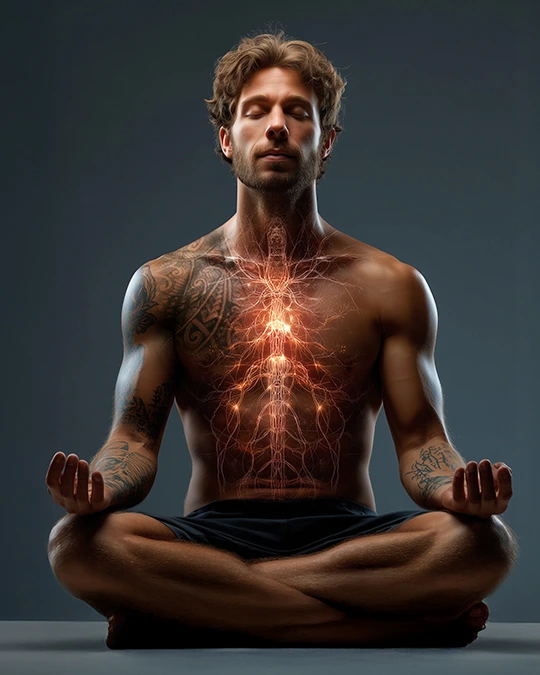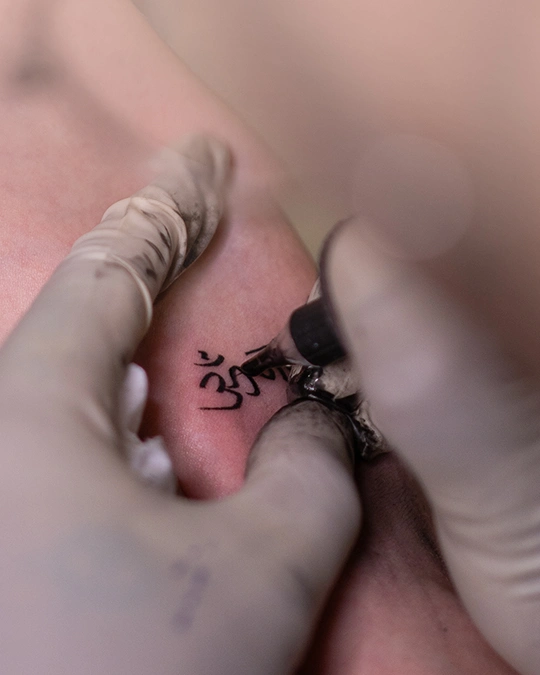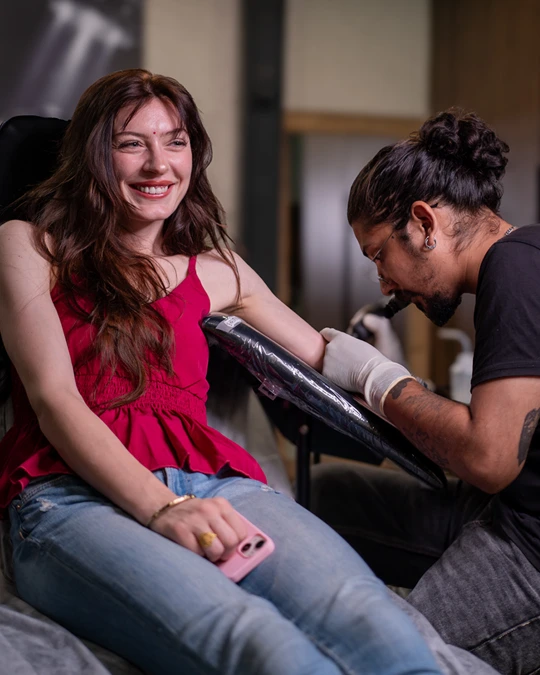Our Ancestors believed Tattoos could hold Energy
- Team Aliens
- May 11, 2025
- 8 min read
Updated: Aug 13, 2025

Tattoos have long been celebrated as expressions of personal identity, milestones, and aesthetic choices. But beyond their surface appeal, many believe that tattoos may hold something deeper—energy. The question arises: Can a tattoo really hold energy?
Throughout history, tattoos have been seen as more than just decoration. In many ancient cultures, tattoos were thought to carry power, protect the wearer, or mark significant spiritual and emotional milestones. Today, while tattoos may still be viewed as symbols of identity, many are exploring whether they also serve as conduits for emotional, psychological, and even spiritual energy.
In this blog, we’ll dive into the fascinating concept of tattoos as energy-holding vessels. Can a tattoo capture and reflect our emotions, memories, and transformative experiences? Do tattoos have the potential to store and transmit energy, both from within ourselves and from the world around us? Let’s explore the idea of tattoos as more than just body art, but as a form of personal alchemy—transforming intangible forces into permanent, meaningful symbols on our skin.
Understanding Energy and Its Forms
Before diving deeper into how tattoos may hold energy, it’s important to first define what we mean by “energy.” In many spiritual, psychological, and scientific contexts, energy is often understood as the force that drives everything—emotions, thoughts, and even physical actions. It’s something that moves, flows, and transforms, yet remains invisible to the naked eye.
Emotional Energy
Emotions themselves are a form of energy. When we feel joy, sadness, love, or anger, these emotions aren't just fleeting experiences—they are energy in motion, shifting our body, mind, and spirit. This energy can be positive, negative, or neutral, and it can stay with us, lingering in our cells or in our psyche, unless it’s consciously transformed or released.
Mental and Spiritual Energy

Alongside emotions, our thoughts and beliefs also carry energy. The thoughts we hold about ourselves, others, or the world contribute to the energy we emit, which in turn influences our environment. Spiritually, energy can also be viewed as a force that connects us to higher consciousness, to the universe, or to the collective energy of humanity.
In the context of tattoos, this energy is transformed into form—specifically, into visual symbols. What was once an invisible emotional or spiritual state becomes a visible and permanent mark on the body. Tattoos can act as conduits that carry the internal, intangible energy outward, making it manifest for others to see and for the individual to carry with them always.
Scientific Insights: Tattooing and the Body’s Energy System
Tattoos are more than just an art form; they may also have an impact on our body’s energy system. From a scientific standpoint, the process of tattooing could be understood as a channeling of energy, where the unseen emotional, psychological, and spiritual forces within us are transformed and expressed through ink on skin. Tattoos, in this sense, may not only serve as a visual expression but also play a role in aligning our internal energy with our outward physical form.
Biology of Tattooing
Tattooing, at its core, affects the body in various ways, especially the skin, nervous system, and overall energy flow. The skin, as the body’s largest organ, is where tattoos leave their mark, but it’s also where energy is channeled. The act of tattooing triggers the body’s natural healing processes—when the tattoo needle punctures the skin, it sends signals to the nervous system, which then works to heal the tiny punctures. This process could create an energetic shift within the body, aligning the inner self with the outward expression.
Additionally, tattooing may influence the bioelectricity of the body, affecting the body’s electromagnetic field. Tattoos can be seen as a form of energetic imprints, where emotions or transformative moments are transformed into a lasting physical form. In this way, a tattoo could be thought of as holding or storing emotional and psychological energy, capturing those experiences permanently.
Neurochemical Response
The tattoo process itself also triggers the body’s neurochemical response. The discomfort experienced during tattooing leads to the release of endorphins, adrenaline, and other neurochemicals—all of which are associated with the body’s reaction to pain, stress, and pleasure. This hormonal response may contribute to emotional and energetic shifts, helping the individual feel a sense of release, empowerment, or even catharsis during and after the process.
This energetic shift could be seen as a release of old energy or an introduction of new energy, as the act of getting a tattoo often accompanies emotional releases or transformations. It’s as if the tattoo serves as a catalyst for energy—helping to process and release trapped emotions, memories, or even empowerment gained through personal milestones.
Tattooing and Energy Flow
Tattooing may also influence the body’s natural energy flow, in ways that could be linked to acupuncture points or energy meridians, as seen in traditional Chinese medicine. Just as acupuncture is used to balance the flow of energy within the body, tattoos placed on specific areas of the body could be seen as working in harmony with the chakras or energy centers, helping to unblock or enhance energy flow.
For example, a tattoo placed over a specific chakra could be viewed as strengthening or aligning that particular energy center, helping to enhance the wearer’s energy in that area. Whether it’s about healing, protection, or empowerment, tattoos can be seen as aligning the internal energy of the wearer with their outward self-expression, serving as a conduit to balance or amplify their energy.
Ancient Cultures and Tattoos as Energy Vessels
Tattoos have held profound significance for centuries, far beyond their aesthetic appeal. In many ancient cultures, tattoos were believed to carry energy, often tied to spiritual beliefs, protection, and transformation. These cultures understood tattoos not just as art, but as a powerful force with spiritual and energetic purposes.
Tattoos in Indigenous Cultures
Many indigenous cultures, such as the Maori, Polynesians, and Native Americans, viewed tattoos as more than just marks on the body—they were believed to hold spiritual power, providing protection, guidance, and a connection to the divine. These tattoos often represented ancestral spirits, gods, or personal milestones, and were thought to carry the energy of the person’s ancestors or experiences. The energy of the tattoo was seen as something that not only empowered the wearer but also allowed them to connect with the energies of their lineage and their community.
For example, in Polynesian culture, tattoos were deeply spiritual. The designs were carefully chosen to reflect identity, rank, and protection, with certain patterns said to carry ancestral energy, ensuring the wearer’s safety and strength. Similarly, in Maori culture, tattoos (or "moko") were believed to embody personal power and were a mark of honor and strength, connecting the wearer to their ancestral lineage.
Tattoos as Markers of Transformation in Ancient Egypt and Rome
In ancient Egypt, tattoos were used for both spiritual and medicinal purposes. Women, in particular, often wore tattoos as protective symbols during childbirth, believed to channel protective energies and prevent harm. These tattoos were considered sacred, symbolizing the connection between the human body and divine forces.
In ancient Rome, tattoos were typically associated with slaves and soldiers, often used as a mark of identity. However, the Roman military also believed that tattoos could provide protection and strengthen the wearer’s resolve in battle, reflecting a belief in the power of the symbols themselves to channel personal strength and courage.
Tattoos and Energy in Modern Spiritual Practices
Today, many modern spiritual practices still view tattoos as energy vessels. Some practitioners of Reiki, chakra healing, and spiritual wellness believe that tattoos can amplify or align energy within the body, especially when placed on or near specific energy centers (like chakras). In these practices, tattoos are seen as tools for personal growth, protection, or even healing, holding the energy of the individual’s intentions, beliefs, or personal journey.
Tattoos as Conduits for Energy
Tattoos, in their essence, are not just decorative or personal symbols—they act as conduits for energy. They provide a channel for emotional, spiritual, and psychological energy, translating the intangible into something visible and permanent on the body. This process doesn’t just involve aesthetic or superficial choices, but also deeply integrates the energies we carry within, giving them a physical form that accompanies us for life.
Emotional Energy and Release

Pain, when consciously embraced in a safe and mindful space, has the ability to regulate the nervous system. The sharp sting of the needle brings your awareness into your body, anchoring you in the present moment. It draws you into presence, breath, and release. For some, this sensation triggers deep emotional responses—feelings that have been buried beneath the surface, waiting to be expressed. Tears, memories, or grief can emerge, and though it may feel overwhelming, the experience doesn’t paralyze; instead, it moves. Think of it as an emotional exhale—an intentional release of built-up energy.
The science behind this? Tattooing activates both the sympathetic (fight or flight) and parasympathetic (rest and digest) systems, creating a dynamic shift between tension and surrender. As you feel the discomfort, your body responds—sweating, breathing, and ultimately finding a sense of grounded release. In this way, tattoos become much more than just decoration—they become a form of embodied therapy, allowing you to release, transform, and integrate emotional energy in a way that is both healing and empowering.
Healing Through Ink
Tattoos are not only expressions of personal growth but also tools for healing. Many people turn to tattoos after a traumatic experience, as a way to transform pain into power. A tattoo can serve as a reminder of overcoming hardship, helping to integrate the emotional scars into a new narrative—one that is no longer defined by suffering but by strength and resilience.
Tattoos can also represent self-love and self-acceptance, creating a symbol of healing and personal empowerment. The ink becomes a way to take ownership of past experiences, turning them into something beautiful, meaningful, and positive. Through this process, the tattoo acts as a form of therapy, providing a visual reminder of the wearer’s journey toward healing.
Tattoos as Energy Portals
In the same way that certain rituals or symbols are used to direct energy, tattoos can act as energy portals. A tattoo placed on specific areas of the body can channel energy toward or away from a particular part of your life. This could be to enhance specific qualities like protection, love, strength, or balance, depending on the design and intention behind the tattoo.
For instance, people may choose to place protective symbols on the chest or back, seeking to guard their emotional or spiritual well-being. Likewise, designs aligned with healing might be placed over the heart, symbolizing the repair of emotional wounds. These energy portals reflect the tattoo’s deeper purpose and act as reminders of the energy the wearer intends to hold, protect, or manifest in their lives.
Bad Energy: When Tattoos Hold Residual Pain
Just as tattoos can hold powerful, positive energy, they can also carry the opposite—residual energy from pain, shame, spite, or impulsive decisions. Ink created from a place of negative emotion or external pressure can leave behind an energetic imprint. Some people describe feeling "off" after getting a tattoo, as if their energy shifted, or they suddenly didn’t recognize the part of themselves they had just marked.
This doesn’t mean the tattoo is “bad” or “cursed,” but it might be asking for healing. Sometimes, this manifests in a desire for a cover-up, removal, or simply a shift in the tattoo’s meaning—reclaiming the narrative in a way that aligns with who they are now, not who they were when the tattoo was first made.
Just as we change and grow, so can the energy of our tattoos. They’re not static; they evolve with us if we allow them to. Tattoos can become tools of transformation—not only reflecting who we were but also helping us embrace who we are becoming.
Tattoos as Living Symbols of Energy
In the end, tattoos are far more than just aesthetic body art. They act as conduits for energy, holding and channeling emotions, memories, and personal transformations. They reflect and transform our internal energy into visible, permanent marks, serving as living symbols of our emotional and spiritual journeys.
Whether you choose a tattoo to mark a personal transformation, honor a loved one, or simply express who you are, remember that each tattoo holds meaning far beyond the ink. Tattoos are a way to capture and carry the energy of your experiences, offering a permanent reflection of who you are, who you've been, and who you're becoming.












